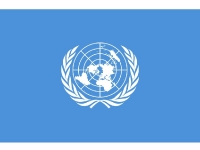Lifestyle
UNITED NATIONS on Global Issues - DECOLONIZATION
The wave of decolonization

UNITED NATIONS
USPA NEWS -
When the United Nations was founded in 1945, some 750 million people, nearly a third of the world's population, lived in Territories that were dependent on colonial Powers. Today, fewer than 2 million people live under colonial rule in the 16 remaining non-self-governing territories....
When the United Nations was founded in 1945, some 750 million people, nearly a third of the world's population, lived in Territories that were dependent on colonial Powers. Today, fewer than 2 million people live under colonial rule in the 16 remaining non-self-governing territories. The wave of decolonization, which changed the face of the planet, was born with the UN and represents the world body´s first great success.
The international trusteeship system was established by the UN Charter. Affirming the principle of self-determination, the Charter describes the responsibility of States for territories under their administration as 'a sacred trus'“ in which the interests of their inhabitants are paramount.
The Charter also created the Trusteeship Council as a main organ of the UN. It was to monitor the situation in 11 specific 'Trust Territories' which were subject to separate agreements with administering States. These territories had been formally administered under mandates from the League of Nations, or separated from countries defeated in the Second World War, or voluntarily placed under the system by their administering Power.
The Charter also created the Trusteeship Council as a main organ of the UN. It was to monitor the situation in 11 specific 'Trust Territories' which were subject to separate agreements with administering States. These territories had been formally administered under mandates from the League of Nations, or separated from countries defeated in the Second World War, or voluntarily placed under the system by their administering Power.
As the process of decolonization continued to advance, the General Assembly, in 1960, adopted its landmark Declaration on the Granting of Independence to Colonial Countries and Peoples. The Declaration affirmed the right of all people to self-determination and proclaimed that colonialism should be brought to a speedy and unconditional end. Two years later, a Special Committee on decolonization was established to monitor its implementation.
Success followed success, and the United Nations commitment remained strong. In 1990, the Assembly proclaimed the International Decade for the Eradication of Colonialism (1990-2000), which included a specific plan of action. In 2001, it was followed by a Second International Decade for the Eradication of Colonialism. The end of the Second Decade coincided with the fiftieth anniversary of the Declaration on the Granting of Independence to Colonial Countries and Peoples. At the same time the General Assembly declared the period 2011““2020 the Third International Decade for the Eradication of Colonialism.
Since the creation of the United Nations, 80 former colonies have gained their independence. This includes all 11 Trust Territories, which have achieved self-determination through independence or free association with an independent State. The Special Committee continues to monitor the situation in the remaining 16 territories, working to facilitate their advance towards complete self-determination.
Source : United Nations
Ruby BIRD
http://www.portfolio.uspa24.com/
Yasmina BEDDOU
http://www.yasmina-beddou.uspa24.com/
Source : United Nations
Ruby BIRD
http://www.portfolio.uspa24.com/
Yasmina BEDDOU
http://www.yasmina-beddou.uspa24.com/
Ruby Bird Yasmina Beddou Decolonization United Nations Global Issues Territories Colonial Powers Rules International Trusteeship System
Liability for this article lies with the author, who also holds the copyright. Editorial content from USPA may be quoted on other websites as long as the quote comprises no more than 5% of the entire text, is marked as such and the source is named (via hyperlink).






